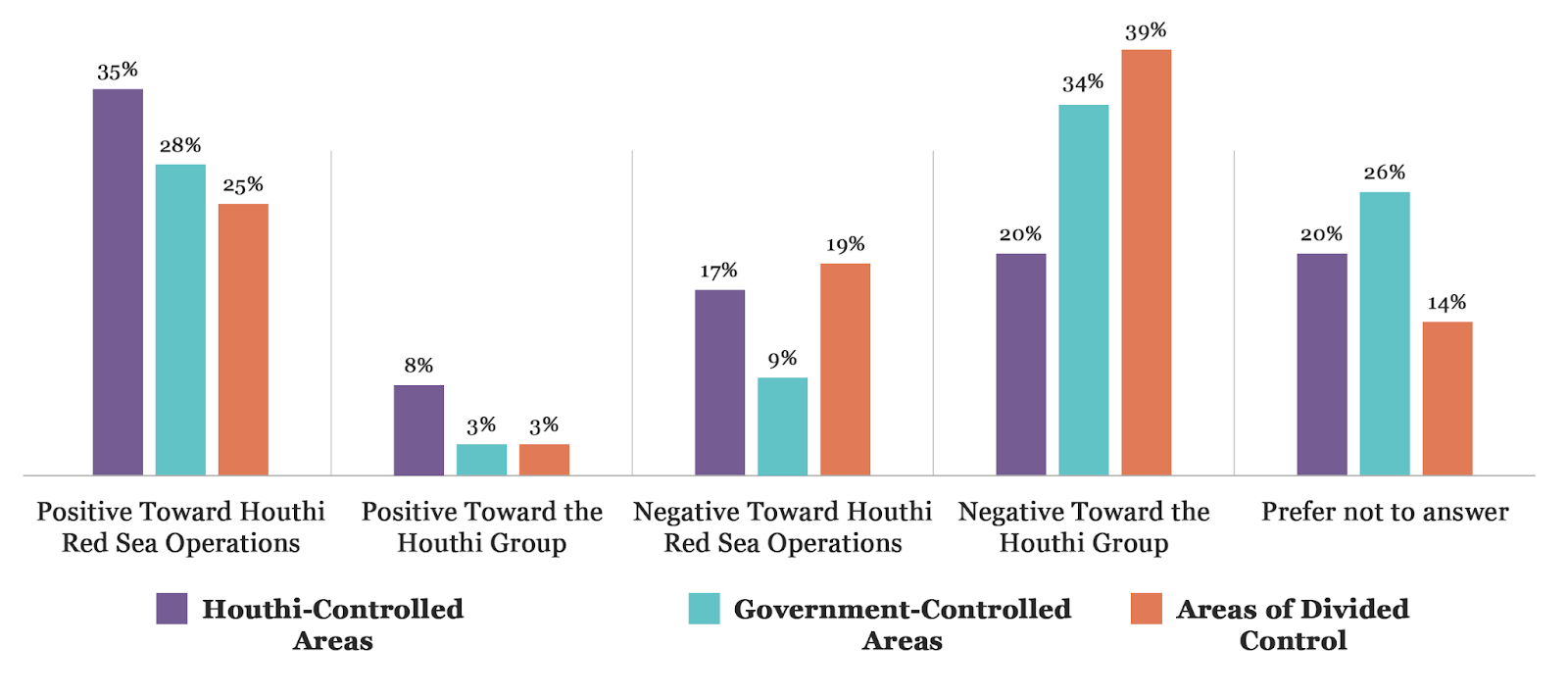A rapid survey conducted by the Sana’a Center for Strategic Studies indicates that Yemeni support for Houthi operations in the Red Sea does not necessarily equate with a favorable view of the Houthi group (Ansar Allah). Following the first US-UK retaliatory military strikes carried out in January this year, more than 400 Yemeni respondents across 11 governorates were asked their views on Houthi operations in the Red Sea, their perceived impact on the war in Gaza, and the effects of this escalation on peace prospects in the country. As the Houthis gain more regional and global clout, the survey provides an insightful glimpse into how their actions are perceived among Yemenis and the impact of these on their hopes for peace.
Asked about their primary sentiment regarding the attacks in the Red Sea, 36 percent of respondents in Houthi-controlled areas stated that they felt pride, followed by feelings of anxiety at 26 percent, and conflicted feelings at 19 percent. Feelings of pride were particularly high in Sana’a but also in Hadramawt, where 60 percent of respondents in the government-controlled governorate expressed this sentiment. Both governorates also showed strong political engagement, with the highest number of respondents saying they participated in pro-Palestine solidarity protests. Respondents from Al-Mahra, on the other hand, reported the highest sentiment of anxiety, at 50 percent, despite it being the governorate furthest from the Red Sea. In government-controlled areas overall, 25 percent of respondents expressed pride about the Houthi operations, while 22 percent and 25 percent felt anxiety and conflicted feelings, respectively.
The feeling of pride resonates with the popular perception of the Houthis post-October 7 among the wider Arab public and supporters of Palestinians worldwide. Confronted with the inaction of Arab states in the face of the unrelenting assault on Gaza, the Houthis are being widely hailed as one of the few Arab actors standing up against Israel and the genocide of Palestinians. How this heroic image squares with Yemenis living under their rule, however, reveals a more nuanced portrait. Yemen’s long legacy of support for the Palestinian cause has deep historical roots, spanning several decades and different political regimes. Yet, while its current torch-bearers are rising up against oppression in Palestine, in their own country, they are becoming increasingly repressive — a dichotomy that leaves many Yemenis conflicted. Findings from the survey appear to confirm this dissonance.
Figure 1: Sentiment Toward the Houthi Group and Houthi Red Sea Operations
Discrepancies were evident between respondents’ views about the Red Sea operations (positive or negative) versus their overall view of the Houthi group itself. In Houthi-controlled areas, 35 percent of respondents viewed the Red Sea operations positively; however, only 8 percent said they held a positive view of the Houthis. In government-controlled areas, 28 percent of respondents supported the operations, but only 3 percent expressed a positive view of the group. Divided areas of control and government-control areas displayed the highest levels of negativity toward the Houthi group at 39 percent and 34 percent, respectively. Notably, while there is significant popular support for operations in the Red Sea, the dominant perception among respondents — more than half across both Houthi and government-controlled areas — is that the Houthi attacks will not help end the war in Gaza.
Asked about how they view the ramifications of the Red Sea Crisis on Yemen’s path to peace, the majority of respondents expressed a pessimistic outlook. The 2022 ceasefire, momentum built with the Houthi official visit to Riyadh in September 2023, and the subsequent announcement of a UN-led peace roadmap, had begun to instill a sense of optimism among Yemenis that peace was within reach. Before tensions escalated in the Red Sea, 63 percent of respondents had hope in the peace process ending the conflict, according to the survey — glimmers of hope severely undermined by the Houthi attacks in the Red Sea and subsequent US-UK military strikes on Yemen at the start of the year: 76 percent of the respondents said they think this escalation will hinder the peace process.
The survey also revealed widespread anxiety among Yemenis about what the future holds for them. The fear of their country being dragged into a wider regional conflict involving international powers took precedence over all other domestic concerns, including the threat of renewed civil war, a rise in extremist activities, child recruitment to the battlefield, the fragmentation of the country, and territorial expansion by armed groups. Given the deepening crisis over Gaza and the Houthis’ willingness to escalate further — with continuing attacks against Israeli targets — such concern is warranted.
This survey was conducted by the Sana’a Center for Strategic Studies between February 28 and March 20, in the aftermath of the first US-UK airstrikes carried out in January 2024. It emerged in response to growing debate among observers about how the Red Sea operations and Western retaliatory strikes would play out among Yemenis. The survey was distributed to 414 participants in the governorates of Sana’a, Aden, Hudaydah, Marib, Taiz, Abyan, Al-Mahra, Hadramawt, Lahj, Shabwa, and Al-Bayda. While the findings are by no means a comprehensive reflection of the population at large, they give a snapshot of public sentiment. The survey was part of a broader effort by the Sana’a Center to ensure that Yemeni voices are heard and that the Center’s analytical work continues to be informed by Yemenis on the ground.

 اقرأ المحتوى باللغة العربية
اقرأ المحتوى باللغة العربية

